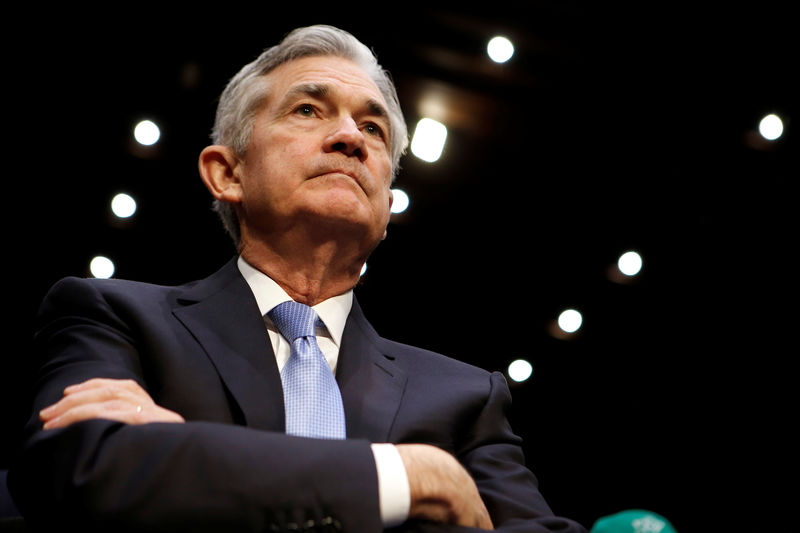By Geoffrey Smith
Investing.com -- Jerome Powell propels gold to a seven-year high as he says a full recovery may not be completed before the end of next year. He still doesn't like negative interest rates, but the Bank of England is getting friendly with the idea and the pound is weakening accordingly. Oil hit a two-month high on growing signs that the global market is rebalancing, while stocks are set to open higher as the developed world emerges more and more from lockdowns. And virtual sparks are set to fly as the WHO starts a two-day annual meeting. Here's what you need to know in financial markets on Monday, May 18th.
1. Powell puts a rocket under gold
Federal Reserve chairman Jerome Powell told CBS that the U.S. economy should recover steadily through the second half of the year but warned that a full recovery may take until the end of 2021. He argued that for consumer confidence to return to its pre-pandemic levels, a successful vaccine will need to be widely available.
Powell also repeated that the Fed still has plenty of ammunition left to protect the economy but repeated the Fed’s opposition to negative interest rates.
His comments helped propel gold prices to a seven-year high overnight, as investors placed ever more bets on real – i.e. inflation-adjusted – rates staying low for a long period of time.
The short-term struggles of the world economy, meanwhile, remained apparent as Japan’s economy recorded a second-straight quarterly contraction, its first recession in over 4 years.
2. WHO annual meeting begins as Navarro targets China
The World Health Organization began its two-day annual meeting against a backdrop of mistrust and antagonism amongst its biggest members. The meeting will focus on the origins of and responses to the coronavirus pandemic.
However, the WHO has not invited Taiwan, which boasts the world’s most successful pandemic response, having recorded fewer than 500 confirmed cases and only seven deaths due to its aggressive testing and contact tracing. Taiwan is not a member of the UN body due to its lack of international recognition as a state. China, pointedly, has not dropped its opposition to Taiwanese attendance, for all that the island state might have something useful to tell the world.
Over the weekend, Peter Navarro, an economic advisor to the White House, had accused China of ‘seeding’ the pandemic by continuing to allow outbound flights to the rest of the world while it concealed its full knowledge of the Covid-19 virus.
3. Stocks set to open higher; Europe soars as short-selling bans are lifted
U.S. stock are set to open higher after a weekend in which the lifting of lockdowns across the developed world appeared to gather pace.
By 6:30 AM ET (1030 GMT), the Dow Jones 30 futures contract was up 357 points, or 1.5%, while the S&P 500 futures contract was up 1.5% and the Nasdaq 100 futures contract was up 1.2%.
In Europe, the benchmark Stoxx 600 index was up 2.0%, due not least to a sharp rise in mining stocks as investors placed bets on a rebound in industrial activity as well as on gold producers. A number of European regulators lifted the bans on short-selling that they had announced at the outbreak of panic in March.
Stocks in focus on Monday may well include Boeing (NYSE:BA), Citigroup (NYSE:C), Facebook (NASDAQ:FB), Disney (NYSE:DIS) and Bank of America (NYSE:BAC). The Saudi sovereign wealth fund has taken a stake in all of them, reports over the weekend said. Additionally, Goldman Sachs (NYSE:GS) stock will be under the microscope after Berkshire Hathaway (NYSE:BRKa) revealed it sold most of its position in the bank.
4. Oil rallies amid signs of rebalancing
Crude oil prices hit their highest since mid-March amid evidence of the market rebalancing, with gasoline demand recovering in major markets and with both official and private producers having shut in production in line with their public statements.
By 6:30, U.S. crude futures were up 7.3% at $31.67 a barrel, while the global benchmark Brent was up 5.8% at $34.37 a barrel.
Data from the private consultancy Seevol suggested that crude storage at the U.S. national hub in Cushing, Ok., had fallen by 5.5 million barrels on the week. If the figures are confirmed by American Petroleum Institute and government data over the next three days, belief in a rapid rebalancing of supply and demand could strengthen even further.
Elsewhere Monday, Total (NYSE:TOT) said it was pulling out of a deal to buy Occidental (NYSE:OXY) Petroleum’s assets in Ghana. Instead, it’s buying some gas and power assets in Spain, in another reflection of the energy industry’s changing priorities.
5. Sterling, gilt yields tank as Bank of England eyes negative rates
Sterling fell to its lowest since late March after the Bank of England’s chief economist Andrew Haldane told the Sunday Telegraph that the BoE’s policy-making committee is reconsidering the issue of negative interest rates.
The BoE had under the last governor, Mark Carney, rejected negative interest rates as ineffective, but Haldane said the bank is now looking at the issue “with greater immediacy”, given the sharpness of the economic contraction.
By 6:30, the pound was at $1.2130, up only marginally from an intraday low of $1.2085. U.K. government bond yields are now implying a high probability of the BoE taking that step: two-year Gilts now yield -0.04%.
